How to Reduce Stress with Healthy and Effective Habits
Stress is something we all deal with, and finding ways to manage it can make a big difference in our lives. The good news is that there are plenty of healthy habits you can adopt to help reduce stress. From exercise to mindfulness, and even laughing more, there are simple steps you can take to feel better. In this article, we’ll explore various strategies to help you learn how to reduce stress effectively and lead a more balanced life.
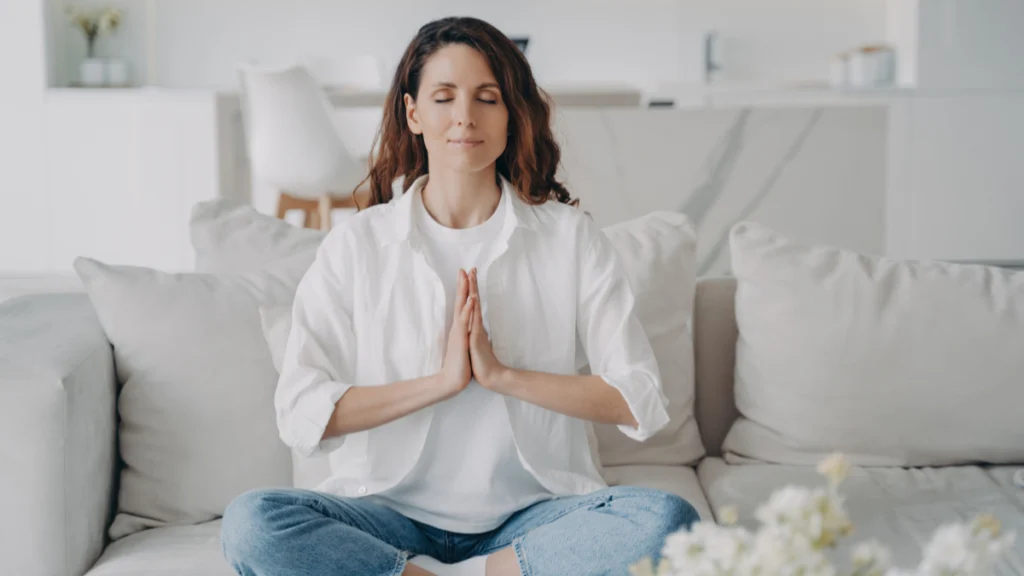
Key Takeaways from How to Reduce Stress
- Exercise regularly to boost your mood and energy levels.
- Eat a balanced diet rich in fruits and vegetables to nourish your body.
- Practice mindfulness techniques like meditation and deep breathing to calm your mind.
- Stay connected with friends and family for emotional support.
- Make time for laughter and fun to lighten your mood.
Table of Contents
- Embrace the Power of Exercise
- Nourish Your Body with Good Food
- Make Time for Mindfulness
- Connect with Your Support System
- Laugh It Off
- Prioritize Self-Care
- Organize Your Life
- Wrapping It Up
- Frequently Asked Questions
Embrace the Power of Exercise
Okay, so exercise. I know, I know, it sounds like a chore. But trust me, it’s one of the best ways to kick stress to the curb. It’s not just about getting in shape; it’s about feeling good, like, really good. When you move your body, you release endorphins, which are basically happy pills your body makes for free. Plus, it gives you a break from whatever’s stressing you out. Think of it as a mini-vacation for your brain.
Get Moving with Fun Activities
Seriously, the key here is fun. If you hate running, don’t run! Find something you actually enjoy. Dancing? Awesome. Hiking? Even better if you like nature. Swimming? Perfect for a hot day. The point is to get your heart rate up and your mind off things. I started home workouts recently and it’s been a game changer.
Try Yoga for Mind and Body
Yoga is like a double whammy for stress relief. It’s exercise, sure, but it’s also a form of meditation. You’re stretching, breathing, and focusing on your body, which can help calm your mind. There are tons of different types of yoga, so find one that fits your style. Even 15 minutes a day can make a difference. Plus, it’s a great way to improve your flexibility. Stretching can release that tension.
Find Your Favorite Workout
This is all about experimenting. Try different classes, different activities, different times of day. Maybe you’re a morning person who loves to get more physical activity before work. Or maybe you prefer to unwind with a walk after dinner. The goal is to find something that you look forward to, not something you dread. Once you find that thing, stick with it!
Exercise doesn’t have to be intense to be effective. Even a brisk walk can do wonders for your stress levels, making it a simple yet powerful way to learn how to reduce stress. The important thing is to move your body and get your blood flowing, which helps clear your mind and boost your mood.
Nourish Your Body with Good Food
Okay, so stress can make you wanna reach for all the wrong stuff, right? Like, chips, cookies, and all that super-processed junk. But trust me, what you eat seriously impacts how you handle stress. Let’s talk about feeding your body the good stuff.
Eat More Fruits and Veggies
Seriously, load up on these. They’re packed with vitamins, minerals, and antioxidants that your body craves, especially when you’re stressed. Think of them as your internal superheroes, fighting off the bad guys (aka stress hormones). I try to add a serving to every meal, even if it’s just some berries with breakfast or a side salad with dinner. It makes a difference!
Stay Hydrated
Dehydration can make stress feel even worse. Sometimes you might feel hungry, but you’re actually just thirsty! Keep a water bottle with you and sip on it throughout the day. Herbal teas also count! I’ve found that healthy aging is easier when I drink enough water.
Avoid Stress-Inducing Foods
Okay, this one’s tough, but important. We’re talking about cutting back on things like excessive caffeine, alcohol, and sugary drinks. These might give you a temporary boost, but they can actually make you feel more anxious and stressed in the long run. It’s all about finding a balance and being mindful of how these foods affect you. I’ve been trying to eat more whole foods lately, and it’s been helping a lot.
Think of food as fuel. The better the fuel, the better your engine (aka your body and mind) will run. It’s not about deprivation, it’s about making smart choices that support your well-being. Learning how to reduce stress starts with nourishing your body with the right foods—nutrient-rich options that boost energy, improve focus, and promote a sense of calm. By choosing whole, unprocessed foods, you’re not just feeding your body; you’re also supporting your mental health and creating a strong foundation for a balanced, stress-free life.
Make Time for Mindfulness
Okay, so life’s a bit of a rollercoaster, right? One minute you’re cruising, the next you’re plummeting down a steep drop. That’s where mindfulness comes in. It’s like hitting the pause button on all the chaos and just… being. It sounds kinda new-agey, but trust me, it’s just about paying attention to what’s happening right now, without getting all caught up in worries about the future or regrets about the past.
Meditate for Inner Peace
Meditation doesn’t have to be some super intense, hours-long thing with chanting and incense (unless you’re into that, then go for it!). Even just five minutes a day can make a difference. There are tons of apps and videos out there that can guide you through it. The goal is to quiet the mental chatter and find a little bit of calm. Think of it as a mental reset button. You can even try mindfulness exercises to get started.
Practice Deep Breathing
Seriously, don’t underestimate the power of a good, deep breath. When you’re stressed, your breathing gets all shallow and rapid, which just fuels the anxiety. Taking a few slow, deep breaths can help calm your nervous system and bring you back to center. You can do it anywhere, anytime. Inhale deeply, hold for a few seconds, and exhale slowly. Repeat until you feel a little more relaxed. It’s like a mini-vacation for your brain. I find it helpful to do this before big meetings or when I’m stuck in traffic.
Try Guided Imagery
Guided imagery is basically using your imagination to create a peaceful scene in your mind. It’s like taking a mental vacation without leaving your chair. Close your eyes and imagine yourself in a place that makes you feel happy and relaxed – maybe it’s a beach, a forest, or even just your favorite cozy spot at home. Focus on the details – the sights, sounds, smells, and sensations. This can help you escape from stressful thoughts and emotions and find a sense of calm. It’s a great way to unwind before bed or during a stressful day.
Mindfulness isn’t about emptying your mind; it’s about learning to observe your thoughts and feelings without judgment. It’s about being present in the moment and accepting things as they are. This practice is one of the most effective ways to reduce stress, as it helps you respond to challenges with calmness instead of reacting impulsively. It takes practice, but it’s worth it. Think of it as training your brain to be a little less reactive and a little more chill—a key step in learning how to reduce stress and improve your overall well-being.
Connect with Your Support System
Life can get pretty overwhelming, right? That’s where having people around you comes in super handy. It’s not just about having someone to hang out with; it’s about having people who genuinely care and can offer a shoulder to lean on.
Reach Out to Friends and Family
Seriously, don’t underestimate the power of a good chat with someone who knows you. Sometimes just venting to a friend or family member can make a world of difference. I know it can be tough to open up, but trust me, they probably want to help. Maybe grab coffee with your bestie, call your mom, or even just text a sibling. These small connections can really boost your mood and remind you that you’re not alone in whatever you’re going through. A social support system is important for your overall mental health.
Join a Community Group
Okay, so maybe you’re thinking, “I don’t have a ton of close friends or family nearby.” That’s totally fine! Community groups are awesome for meeting new people who share your interests. Whether it’s a book club, a hiking group, or a volunteer organization, finding a group of like-minded individuals can provide a sense of belonging and support. Plus, it’s a great way to expand your social circle and learn new things.
Volunteer Your Time
This might sound counterintuitive when you’re stressed, but hear me out. Helping others can actually be a huge stress reliever. When you focus on someone else’s needs, it takes your mind off your own problems for a bit. Plus, it feels good to make a difference! Find a cause you care about and dedicate some time to it. You’ll not only be helping others but also boosting your own well-being. It’s a win-win! Consider joining Bezzy communities to connect with others living with chronic conditions.
Having people in your corner can make all the difference when you’re feeling stressed. Don’t be afraid to reach out, connect, and build a support system that helps you navigate life’s challenges. Learning how to reduce stress often starts with surrounding yourself with a supportive community—it’s all about finding your tribe and knowing you’re not alone.
Laugh It Off
Seriously, don’t underestimate the power of a good chuckle! Life can get heavy, and sometimes the best thing you can do is find something to laugh about. It’s like a mini-vacation for your brain, and who doesn’t need that?

Watch a Comedy Show
Okay, this one’s pretty straightforward. Find a comedian you love, queue up a funny movie, or binge-watch a sitcom. It’s all about finding something that tickles your funny bone. I find that stand-up specials are great because they’re usually pretty short, so you can squeeze one in even when you’re short on time. Plus, it’s a great way to discover new comedians. I recently watched John Mulaney’s “Kid Gorgeous at Radio City” and I was in tears from laughing so hard. It’s all about finding what works for you and stress management.
Share Jokes with Friends
Got a friend who always has a joke ready? Hit them up! Sharing jokes is a great way to connect with people and lighten the mood. Plus, telling jokes can be just as fun as hearing them. I have a group chat with my friends where we just send each other memes and funny videos all day. It’s a constant source of amusement, and it’s a great way to stay connected, especially when we can’t see each other in person. Here’s a joke for you: Why don’t scientists trust atoms? Because they make up everything!
Find Humor in Everyday Life
This one’s a bit trickier, but it can be super rewarding. It’s about training yourself to see the funny side of things, even when things are tough. Maybe it’s the way your cat stares at you while you’re trying to work, or the ridiculousness of traffic jams. It’s about finding those little moments of absurdity and appreciating them. I try to keep a humor journal, where I write down funny things that happened during the day. It’s a great way to remember those moments and revisit them when I need a laugh.
Sometimes, life throws you curveballs. Instead of getting frustrated, try to find the humor in the situation. It might not solve your problems, but it can definitely make them feel a little less overwhelming. Learning how to reduce stress through lightheartedness and laughter is a powerful tool—it shifts your perspective and helps you navigate challenges with a calmer, more positive mindset.
Here are some ways to find humor in everyday life:
- People-watching (in a non-creepy way, of course!)
- Reading funny news headlines
- Watching kids play
Prioritize Self-Care
Okay, let’s talk about self-care. It’s not selfish, it’s essential! Think of it as refueling your tank so you can actually function. We’re talking about making a conscious effort to take care of your mental, emotional, and physical well-being. It’s about recognizing that you matter, and your needs matter too. It’s easy to get caught up in the daily grind, but if you don’t take care of yourself, you’ll burn out. Trust me, I’ve been there.
Schedule Regular ‘Me Time’
Seriously, put it on your calendar! Treat it like an important appointment (because it is!). It doesn’t have to be hours, even 15-30 minutes can make a difference. This is your time to do whatever recharges you. No work, no chores, no obligations. Just you, doing something you enjoy. Maybe it’s reading, maybe it’s wellness topics, maybe it’s just sitting in silence with a cup of tea. The point is, it’s your time.
Indulge in Hobbies
Remember those things you used to love doing before life got so hectic? Yeah, those! Dust off that old guitar, buy some paints, or start that knitting project you’ve been putting off. Hobbies are a fantastic way to de-stress and reconnect with yourself. They give you something to look forward to and a creative outlet to express yourself. Plus, it’s just plain fun!
Take Relaxing Baths
Okay, this might sound cliché, but hear me out. A warm bath can do wonders for your body and mind. Add some Epsom salts, essential oils, or bubbles for extra relaxation. Light some candles, put on some music, and just soak away the stress. It’s like a mini-spa treatment in your own bathroom! Seriously, try it. You might be surprised at how good you feel afterward.
Self-care isn’t a luxury; it’s a necessity. It’s about setting boundaries, saying no when you need to, and making choices that support your overall well-being. Learning how to reduce stress is a key part of this process—whether it’s through mindfulness, exercise, or simply taking time for yourself. It’s about recognizing that you can’t pour from an empty cup and taking steps to refill yours. So, go ahead, prioritize yourself. You deserve it!
Organize Your Life
Okay, let’s be real, a messy life can equal a messy mind. And who needs that kind of stress? Getting organized might sound like a chore, but trust me, it’s like hitting the reset button on your brain. It’s about creating a space where you can actually relax and focus on what matters.
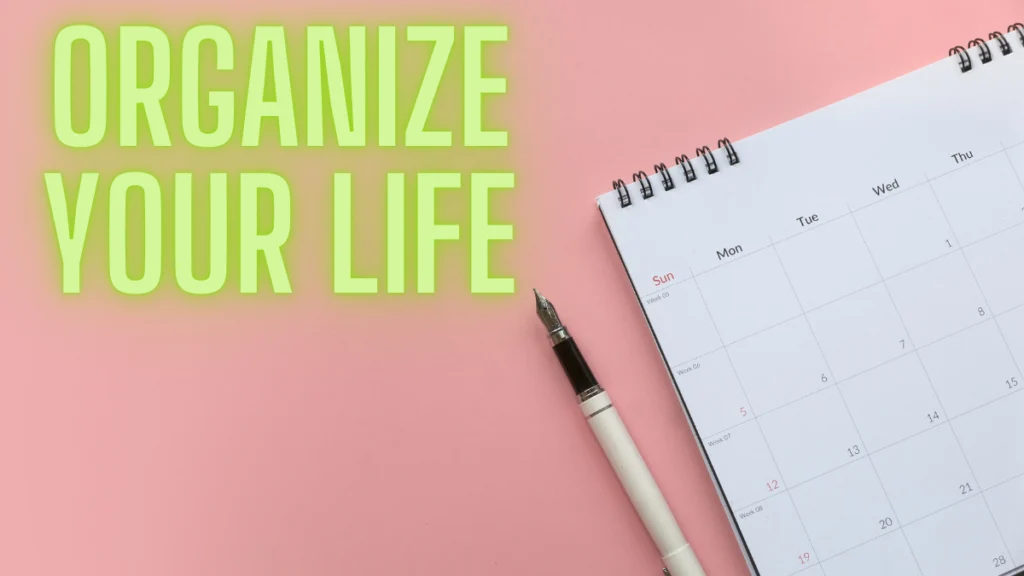
Declutter Your Space
Seriously, look around. Is your space helping you or stressing you out? Clutter can be a major source of anxiety. Start small. Pick one drawer, one shelf, or even just your desk. Get rid of anything you don’t need, use, or love. Donate it, toss it, whatever. Just get it out of your space. You’ll be surprised how much lighter you feel.
Make To-Do Lists
My brain is like a million tabs open at once. To-do lists are my saving grace. Write everything down, no matter how small. Crossing things off is so satisfying, and it keeps you from lying awake at night, panicking that you’ll forget something. I like to break big tasks into smaller, more manageable steps. It makes everything feel less overwhelming.
Set Realistic Goals
Don’t try to become a super-organized guru overnight. That’s just setting yourself up for failure. Start with small, achievable goals. Maybe it’s just making your bed every day or spending 15 minutes decluttering each evening. Once you’ve nailed those, you can add more. Remember, it’s a process, not a race.
Think of organizing as an act of self-care. You’re creating a more peaceful and functional environment for yourself, and that’s something to feel good about. It’s not about perfection; it’s about progress.
Here’s a simple way to think about it:
- Identify: What areas of your life feel most chaotic?
- Prioritize: What’s one small change you can make this week?
- Celebrate: Acknowledge your progress, no matter how small.
Wrapping It Up
So, there you have it! Reducing stress doesn’t have to be a huge chore. Just pick a few of these habits that resonate with you and give them a shot. Whether it’s jotting down your thoughts in a journal, getting lost in a good book, or just having a laugh with friends, every little bit helps. Remember, it’s all about finding what works for you and making it a part of your routine. You won’t nail it every time, and that’s totally fine. Just keep trying, and soon enough, you’ll notice those stress levels dropping and your mood lifting. Here’s to a calmer, happier you!
Frequently Asked Questions
What are some easy exercises I can do to relieve stress?
You can try walking, jogging, dancing, or even gardening. These activities are fun and can help lift your mood.
How can I eat healthier to manage stress?
Focus on eating more fruits and vegetables. Drinking enough water and avoiding junk food can also help.
What is mindfulness and how can I practice it?
Mindfulness means being present and aware. You can practice it by meditating, doing deep breathing, or just paying attention to your surroundings.
Why is it important to connect with friends and family?
Talking to friends and family can help you feel supported and understood, which can reduce stress.
How can laughter help with stress?
Laughing can improve your mood and help you feel more relaxed. Watching funny shows or sharing jokes with friends can be great ways to laugh.
What is self-care and why should I make time for it?
Self-care means taking time for yourself to relax and do things you enjoy. It helps you recharge and feel better overall.
Discover more from Tips and Wellness
Subscribe to get the latest posts sent to your email.

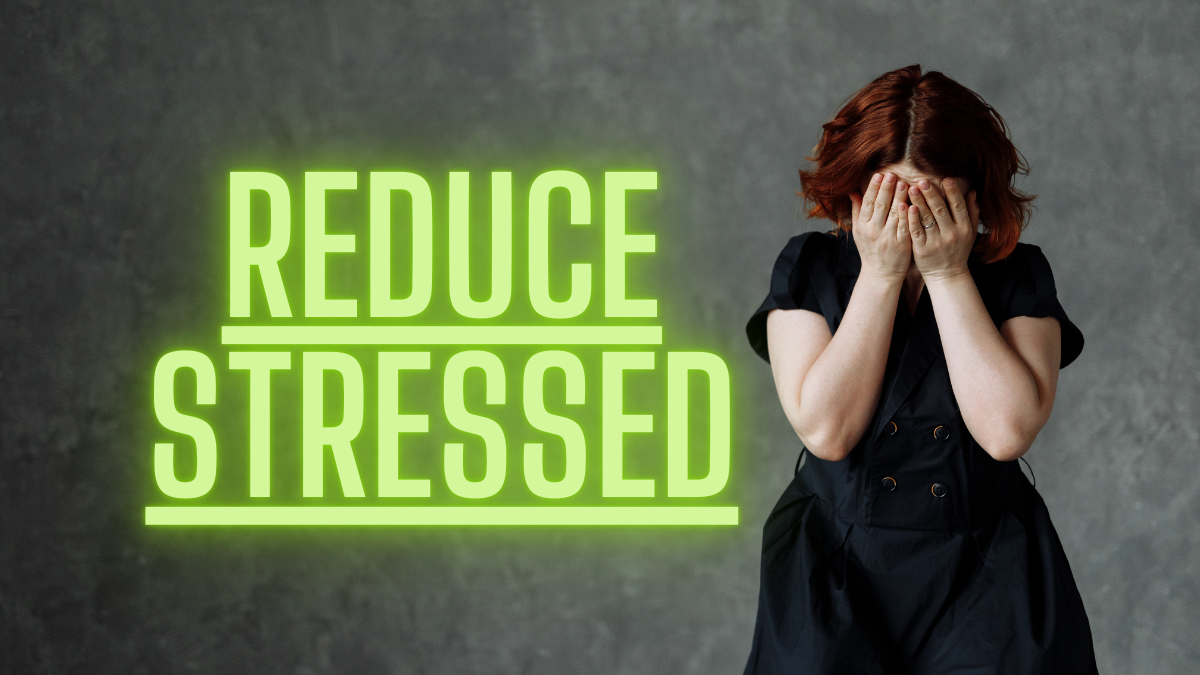
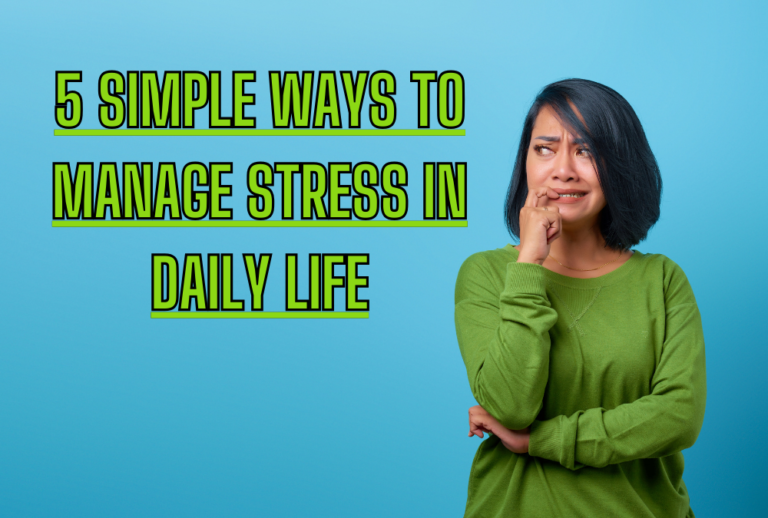

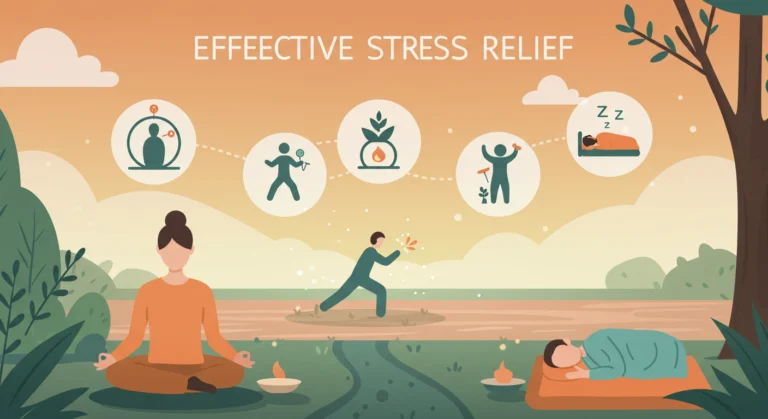
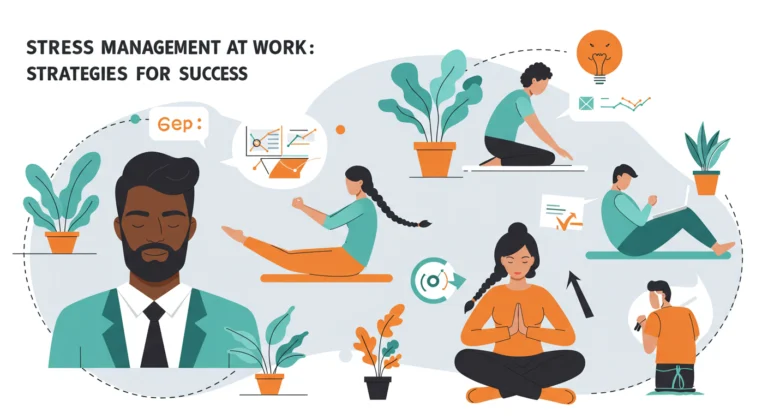

One Comment